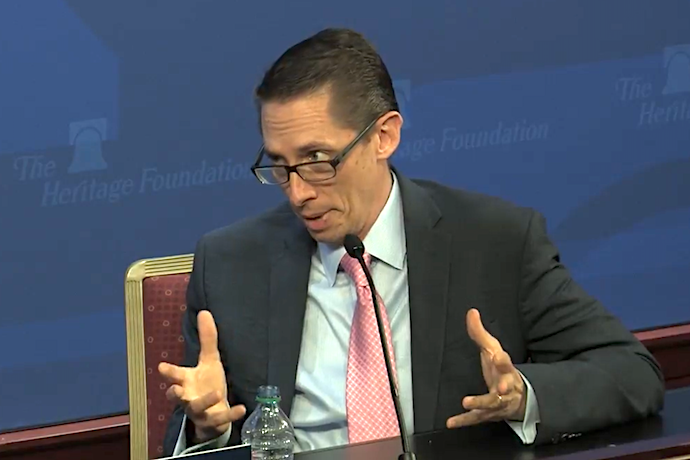This week, Harper’s Magazine set off a firestorm by publishing “A Letter on Justice and Open Debate,” a stilted statement conflating ‘free speech’ with the notion that there should be no consequences for speech, signed by a handful of liberal and left-wing luminaries, a few antagonistic right-wingers, and plenty of people who Mike Masnick colorfully (but accurately) describes as “terribly entitled wannabe ‘controversial’ intellectuals who are really just assholes.”
That’s also a pretty good description of University of Texas at Austin sociologist Mark Regnerus, who didn’t sign the letter, but whose non-academic writing strongly suggests he would wholly embrace its content. Eight years after he published a deceptive and widely excoriated study funded by anti-LGBTQ bigots and used widely in court by opponents of marriage equality, Regnerus’s career is flourishing. But you wouldn’t get the sense from Regnerus’s whining over the unpopularity of his research, including just this week in the pages of Christianity Today, that his career has not evidently suffered.
In his CT cover story promoting his forthcoming book on marriage, Regnerus laments that “the kind of marriage I had in mind [when he started his new research] is no longer hip in the scholarly sphere… Add Christianity to the mix, and you get the holy grail of unfashionable pairings among my peers.”
So Regnerus’s peers despise him, the poor snowflake. And yet he has neither been canceled nor has his pull with the “moderate” end of the conservative evangelical spectrum been in any way compromised. Indeed, even in 2012, the year of the notorious “New Family Structure Study,” CT’s Katelyn Beaty published a softball interview with Regnerus, allowing him to gaslight the public on the nature of his research.
If cancel culture is indeed a thing, it would seem that many of those who most deserve it aren’t getting canceled. Masnick’s commentary, meanwhile, was published on the popular blog Techdirt under the brilliantly biting headline “Harper’s Gives Prestigious Platform to Famous Writers So They Can Whine about Being Silenced.” And therein lies the problem with canceling so-called “cancel culture.” The Harper’s letter argues, incongruously, “The restriction of debate, whether by a repressive government or an intolerant society, invariably hurts those who lack power and makes everyone less capable of democratic participation.” But, as Masnick points out, “‘public shaming’ and ‘ostracism’ are literally examples of counterspeech and open debate.”
More importantly, if the truly powerful, like the established figures who signed the letter, have to deal with public criticism, that’s not the same as being “canceled.” Even the occasional job loss by an elite editor is unlikely to make the editor in question do much belt tightening. Meanwhile, there’s absolutely no equivalence between criticizing people who hold (or enable) dehumanizing opinions—and even, perhaps, applying consequences for those opinions—and the suffering imposed on those who are dehumanized by those opinions (and whose rights may even be restricted by policies grounded in bigotry). Case in point: the transgender community took particular issue with the Harper’s letter, with trans Vox writers Katelyn Burns and Emily VanDerWerf noting the presence of numerous anti-trans signers and anti-trans dog whistles, respectively.
Can “cancel culture” be illegitimately weaponized and used to harm less powerful people? Sure. I’m a freelance writer and a trans woman with no trust fund to my name, and this is something I unfortunately know from personal experience. But it’s a leap to conclude from the inappropriate weaponization of “cancel culture” that all opinions deserve access to all platforms. Nor is this a reason to stick our heads in the sand, ostrich-like, and ignore the very real ways in which unbridled speech in combination with social media can be used to erode democracy by helping to spread bigoted and violent views and by spreading disinformation. It’s notable that, as Vox’s Aja Romano reported, cancel culture arose on Black Twitter and has roots in the Civil Rights Movement.
The fact is, there are always limits to what’s considered acceptable discourse; that is, speech that can be uttered in public without consequences. Political scientists call the range of acceptable opinion bounded by these limits, which can and do shift, the “Overton window.” Disingenuous arguments in favor of unbridled “free speech,” which are really arguments in favor of no consequences for speech, no matter how harmful, help to shift the Overton window to the right, undermining pluralism in favor of upholding intolerance as “brave” rather than, well, intolerant. To be sure, there are people I admire who signed the Harper’s letter, and I believe they are moved by misguided notions about the “marketplace of ideas” resulting in the victory of the best ones. In the age of social media, however, we must recognize the naivete of such a view.
Left unchecked, intolerance will destroy democracy. And intolerance is certainly celebrated not only by the right-wing signers of the Harper’s letter, but also by the Christian Right. Take the aforementioned Regnerus, for example, a man whose writings indicate an obsession with sex, heteronormativity, and “order.” Regnerus is cheered by the fact that “so much about the everyday social world works to reinforce monogamy and the reliable differences between men and women,” and believes that “complementarity and chastity, narrowly defined,” are essential to the flourishing of our society, as without them, “chaos” would supposedly reign supreme. This is precisely the kind of theology—and that’s what it is, even if Regnerus tries to disguise it as sociology—that often allows white male leaders to retain their power in evangelical churches despite credible accusations of abuse and sexual misconduct. Speech, in other words, has consequences that often harm the vulnerable.
Far from helping the powerless, the prominent crusaders against “cancel culture” only enable the Right in its authoritarian impulses that protect (generally white, male, rich) abusers. Evolving social norms can be difficult for people to adjust to. But if prominent intellectuals are truly interested in wrestling with the harmful power dynamics exposed by #MeToo and #ChurchToo, they should start not by decrying “cancel culture,” but rather by examining their own power.





